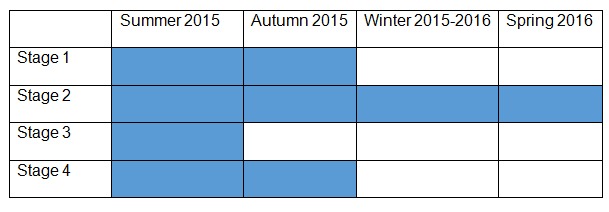Control actions
Due to abundance of food and high fertility, European red foxes spread quite rapidly (Green 2014). Notably, various control programs have existed in different parts of Australia for decades to decrease the population of this predator of southern brown bandicoots (Johnson 2006). It is clear that the control strategy should include diverse mechanisms to be effective. It is possible to divide the strategy into a number of stages.
Stage 1 will include 1080 baiting. It is important to place baits at 300 to 600 metres intervals. The baits should be buried 10cm deep to minimise effects on other animals. It is also necessary to drag baits as foxes will follow the trail and eat more poisoned baits.
This method can also affect other animals in the area. However, these are likely to be other predators (cats) that are also to be controlled. Since the area is inhabited by people, there should be specific signs informing people about poison baiting to keep their domestic animals safe.
Notably, poison baiting often has short-term outcomes and needs to be facilitated by other mechanisms (Fox pest control order 2014). A local conservation agency will be responsible for implementation of this stage.
Stage 2 will involve trapping and training. It is important to add that in areas that are close to people’s settlement baiting is inappropriate and should be replaced by trapping. A local conservation agency will be responsible for that stage.
At that, the organisation will recruit volunteers (it is also possible to collaborate with local schools) to hand out traps and flyers with information on trapping and guard animals. People will also be informed about ways to inform the agency about animals caught. People will also learn more about guard animals (usually dogs).
Stage 3 will include electric fencing. The fences will be placed around the areas that are most favourable for southern brown bandicoots to make sure that the population of these mammals can increase (Integrated predator control strategy 2013). The local conservation agency will also be responsible for that stage.
Stage 4 will involve shooting. The local conservation agency will address local hunters as well as corresponding agencies (Sporting Shooters Association of Australia Sporting Conservation). This stage also involves some degree of volunteering as hunters will not be paid, as the shooting will be a part of the hunt season.
Monitoring
Importantly, implementation of each stage will be properly documented and monitored by assigned agencies, as this is one of the most important premises for effectiveness of the strategy (Report to inform a revised Sub-regional Species Strategy 2013).
Webb, Harlow and Pike (2014) also stress that red foxes control management is quite costly and this is why it should be monitored properly. Local Lands Services will be responsible for implementation of monitoring of the strategy. The agency will report about effectiveness of the program and will provide its recommendations.
Timeline
The program will last one year (see table 1). Fencing will take 2 months, as it will involve installing fences, but each month there will be inspections to check if fences are not damaged.

Budget
- Stage 1: Cost of poison and baits will be approximately $4,000.
- Stage 2: Trapping (purchasing and installing traps) and production of training flyers will make up $8,000. Volunteers will implement training and handing out flyers.
- Stage 3: Fencing (purchasing and maintaining) will make up approximately $7,000.
- Stage 4: Since it will be partially implemented by volunteers, it will cost around $3,000.
Reference List
Fox pest control order, 2014. Web.
Green, M., 2014, ‘Little fox, big problem‘, The Age. Web.
Integrated predator control strategy for the southern brown bandicoot in the south-east sub-region, 2013. Web.
Johnson, C., 2006, Australia’s mammal extinctions: a 50,000-year history, Cambridge University Press, Cambridge.
Report to inform a revised Sub-regional Species Strategy for the Southern Brown Bandicoot, 2013. Web.
Webb, J. K., Harlow, P. S., & Pike, D. A., 2014, ‘Australian reptiles and their conservation’, in A Stow, N Maclean & GI Holwell (eds), Austral ark, Cambridge University Press, Cambridge, pp. 354-382.